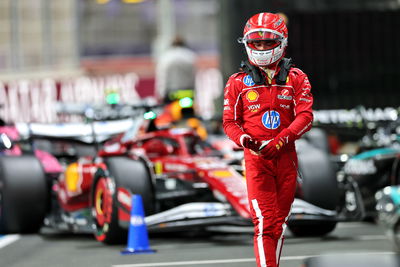Michelin slams 2006 tyre regs.
Michelin has become the first organisation to speak out against the raft of rule changes rubber-stamped by the World Motor Sport Council on Wednesday, claiming that they fly in the face of the cost-cutting ethos being propounded by the sport's governing body.
Michelin has become the first organisation to speak out against the raft of rule changes rubber-stamped by the World Motor Sport Council on Wednesday, claiming that they fly in the face of the cost-cutting ethos being propounded by the sport's governing body.
The French company has said that it is 'perplexed' by what it sees as a backward step, following the FIA's decision to re-admit mid-race tyre changes to the regulation for 2006. The governing body insists that the tactic was only removed from the rules in order to contain escalating speeds in 2005, a problem it now feels will be contained by the switch to 2.4-litre V8 engines next year.
Michelin is also annoyed that the WMSC has agreed to the use of more tyres per team from 2006, claiming that the change was made 'without advance notice', and that both rule 'changes' are 'incoherent with the cost reduction objectives sought by FIA president [Max Mosley]'.
The tyre manufacture complains that the new rules will immediately increase tyre development, production and logistics costs by 15 per cent as, contrary to what has been said, the technology produced for 2005 cannot simply be adapted to the new 2006 regulation. This, the company insists, 'reveals a lack of technical understanding of the product and of what a tyre really is'.
Michelin claims that, as tyre wear and grip are calculated to ensure optimum performance for a specific distance, switching from a tyre designed to run for 350km in 2005 to one that can be changed every 100km - or less - next season will require the design of an entirely new generation of tyres, increasing costs.
Underlying Michelin's arguments, however, is surely the fear that the advantage it enjoyed over rival Bridgestone in 2005 could now be wiped out by the introduction of the new rules package. The French company not only had a superior tyre over a full race distance, but one that allowed its team to generate better temperatures in the single-lap qualifying session - something else to disappear in 2006. With the likelihood of a single tyre supplier being appointed to F1 from 2008, Michelin clearly believes that Bridgestone is being given a helping hand to bring it back to parity next season, with the fear that the Japanese company will be the one favoured for the sole supply contract.
"Michelin questions the FIA's hidden motivations for the 2006 F1 regulation," a statement issued by the French company said, "Once again, this event illustrates the F1?EUR(TM)s problems of incoherent decision-making and lack of transparency.
"In light of this situation, Michelin would like to thank its partner teams who did everything possible, unfortunately in vain, to inhibit a last minute new regulation returning, in fact, to previous regulations."











